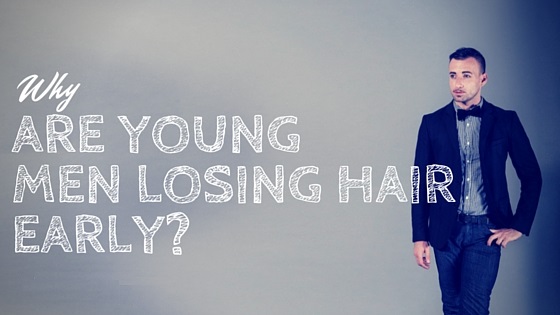
Thinning Hair in Young Men
Even though thinning of the hair is a natural aging process, however, numerous men experience thinning hair prematurely. According to research, 50 percent of men experience the ill effects of a type of hair loss called androgenetic alopecia or male pattern baldness. If you are a young man and experiencing thinning of hair, it is likely that you have inherited this type of permanent hair loss. However, there are other possible causes.
DHT
As indicated by research, DHT, or dihydrotestosterone, is an androgen, which is a product of the male hormone testosterone and the root cause of 95 percent of hair loss in male pattern baldness. Men have more DHT present in the body than women, which explains why they suffer more from balding. DHT kills the hair follicles by blocking them from getting the nutrients they need to survive.
Alopecia Areata
Alopecia areata is the name given to male pattern baldness when it appears in patches, and it can be another likely cause of hair loss in young, healthy males. An autoimmune disease, alopecia areata is the aftereffect of an overactive immune system attacking its own cells. Research says that it is largely genetic and can be triggered by viral infections or stress. Alopecia areata can go into remission for long or short periods, sometimes never returning.
Skin and Scalp Condition
Seborrheic eczema popularly known as dermatitis is one of the most common reasons that lead to hair fall. This skin condition causes flaky and scaly patches on the skin called as dandruff that loosens the hair follicles leading to hair fall.
Other Forms
Major reasons for Hair loss is poor nutrition, medications, and drugs, hormonal changes, excessively tight hairstyles, scarring, and inflammation. Even physical or emotional shock can lead to hair loss. This is known as telogen effluvium hair loss. Most of the times these forms of hair loss are often temporary.
Treatments
There are two drugs that are recommended to treat baldness and thinning hair in men.
Minoxidil Lotion
Apply twice a day to the scalp and it can slow down or prevent further hair loss. The lotion is available over-the-counter. Some patients benefit from it to varying degrees and some have even seen regrowth. Its effects start to wear off as soon as you stop using the lotion.
Finasteride (Propecia)
It is a medication in tablet form that to some extent blocks the effects of the male hormones (an ‘anti-androgen’). Propecia has shown to further halt hair loss and promote re-growth of scalp hair in approximately 80 percent of patients after about three to six months. The benefits of the treatment also stop once you stop taking the medication.
You may likewise also consider cosmetic surgery. It is a reliable way to replace lost hair. Techniques include scalp reductions, flap surgery, and transplants – although these techniques are expensive with long-term solutions.
Hair Gro Therapy
It helps to fight hair fall naturally and what makes it safe with no side effects is that it does not contain any chemicals, unlike other hair growth supplements and formulas available. It is a one for all hair problems solution. Each essential oil works in a unique way and not only addresses the problem of hair weakening, thinning hair and strengthening of the roots but also help to nourish the hair and fight issues like dry scalp, inflammation, allergies, itching, oily and greasy hair, split ends, dandruff. It helps in improving blood circulation; reduce stress, and makes hair thicker and stronger.
Side Effects
Minoxidil lotion: The side effects of the lotion are scalp and skin irritation. More rarely it can cause changes in texture and hair color.
Finasteride: Visible side effects are uncommon, however, now and then the medicine can cause a rash, and a small percentage of users may experience reduced libido, erection problems or breast and/or nipple tenderness.
Hair Gro Therapy: No side effects
